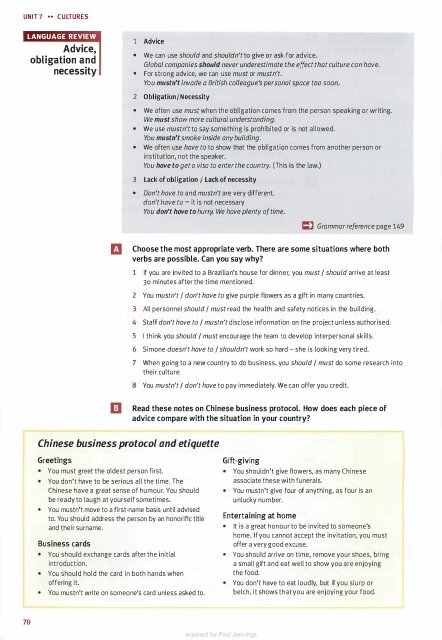Market Leader Intermediate 3rd edition SB
Create successful ePaper yourself
Turn your PDF publications into a flip-book with our unique Google optimized e-Paper software.
UNIT 7 •• CULTURES<br />
LANGUAGE REVIEW<br />
Advice,<br />
obligation and<br />
necessity<br />
1 Advice<br />
o We can use should and shouldn't to give or ask for advice.<br />
Global companies should never underestimate the effect that culture can have.<br />
•<br />
For strong advice, we can use must or mustn't.<br />
Yo u mustn't invade a British colleague's personal space tao soon.<br />
2 Obligation/Necessity<br />
o<br />
o<br />
o<br />
We often use must when the obligation comes from the person speaking or writing.<br />
We must show more cultural understanding.<br />
We use mustn't to say something is prohibited or is not allowed.<br />
You mustn't smoke inside any building.<br />
We often use have to to show that the obligation comes from another person or<br />
institution, not the speaker.<br />
Yo u have to get a visa to enter the country. (This is the law.)<br />
3 Lack of obligation / Lack of necessity<br />
o<br />
Don't have to and mustn't are very different.<br />
don't have to = it is not necessary<br />
Yo u don't have to hurry. We have plenty of time.<br />
c:J Grammar reference page 149<br />
m Choose the most appropriate verb, There are some situations where both<br />
verbs are possible. Can you say why?<br />
1 If you are invited to a Brazilian's house for dinner, you must / should arrive at least<br />
30 minutes after the time mentioned.<br />
2 You mustn't / don't have to give purple nowers as a gift in many countries.<br />
3 All personnel should / must read the health and safety notices in the building.<br />
4 Staff don't have to / mustn't disclose information on the project unless authorised.<br />
5 I think you should / must encourage the team to develop interpersonal skills.<br />
6 Simone doesn't have to / shouldn't work so hard - she is looking very tired.<br />
7 When going to a new country to do business, you should / must do some research into<br />
their culture.<br />
S<br />
You mustn't / don't hove to pay immediately. We can offer you credit.<br />
III Read these notes on Chinese business protocol. How does each piece of<br />
advice compare with the situation in your country?<br />
Chinese business protocol and etiquette<br />
Greetings<br />
o<br />
o<br />
You must greet the oldest person first.<br />
You don't have to be serious all the time. The<br />
Chinese have a great sense of humour. You should<br />
be ready to laugh at yourself sometimes.<br />
• You mustn't move to a first-name basis until advised<br />
to. Yo u should address the person by an honorific title<br />
and their surname.<br />
Business cards<br />
o<br />
o<br />
You should exchange cards after the initial<br />
introduction.<br />
You should hold the card in both hands when<br />
offering it.<br />
• You mustn't write on someone's card unless asked to.<br />
Gift-giving<br />
o<br />
o<br />
You shouldn't give nowers, as many Chinese<br />
associate these with funerals.<br />
You mustn't give four of anything, as four is an<br />
unlucky number.<br />
Entertaining at home<br />
• It is a great honour to be invited to someone's<br />
home. If you cannot accept the invitation, you must<br />
offer a very good excuse.<br />
• You should arrive on time. remove your shoes, bring<br />
a small gift and eat well to show you are enjoying<br />
the food.<br />
o<br />
You don't have to eat loudly, but if you slurp or<br />
belch, it shows that you are enjoying your food.<br />
70<br />
scanned for Paul Jennings


